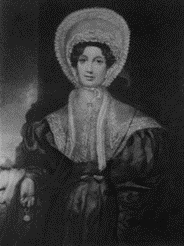Susan Ferrier
1782-1854
Was the daughter of James Ferrier (1744–1829), writer to the signet and one of the principal clerks of the Court of Session, in which office he was the colleague of Sir Walter Scott. Ferrier was educated privately but came to know through her family many notable Edinburgh people, including Scott and the novelist Henry Mackenzie. Her father first took her in 1797 to Inveraray, home of his client and patron John Campbell, 5th Duke of Argyll, where she became a friend of the family, especially of a granddaughter, Charlotte Clavering (died 1841), with whom she corresponded. Susan Ferrier kept house for her father after her mother died and three older sisters had got married. Like many well-to-do Edinburgh families, they took a house outside the city in the summer, East Morningside House. Although she still wished her work to appear anonymously, her identity was widely known by then. Ferrier's own tastes in literature appear in her correspondence. She was an admirer of Jane Austen and of Sir Walter Scott (although she had reservations about some works of his). The last of several visits to London was paid in 1830 to see an oculist, when she stayed for a few days at the villa of Lord Casilis in Isleworth. Brought up in the Church of Scotland, Ferrier joined the Free Church after the Disruption of 1843. She died on 5 November 1854 at a brother's house at 38 Albany Street, Edinburgh, and was buried in St Cuthbert's Churchyard. Ferrier wrote three novels. Marriage was written in 1810 but much revised and came out anonymously only in 1818, when the Edinburgh publisher William Blackwood paid £150 for it. Its success was remarkable, and it appeared in French in 1825. In 1824 Blackwood was prepared to pay £1000 for the second novel, The Inheritance. The third novel, Destiny, was dedicated to Scott, who found that Robert Cadell of Edinburgh was willing to pay £1700 in 1831. The author sold the copyrights in 1841 to Richard Bentley, who reissued them with authorial revisions in an illustrated edition. This was reprinted for the first time in Ferrier's name in 1851.The novels, which combine humour with vivid accounts of Scottish social life and sharp views on marriage and female education, retained their popularity through the 19th century, but then it began to wane, although editions of Marriage have appeared sporadically since the Second World War.
